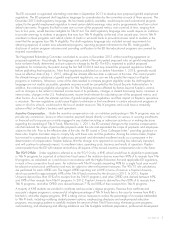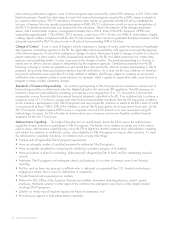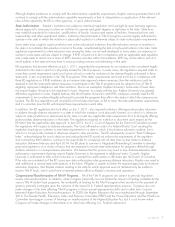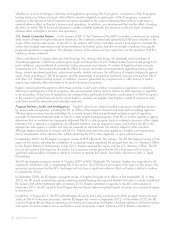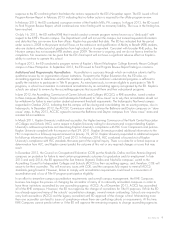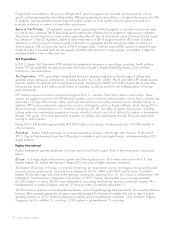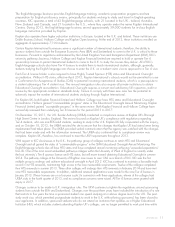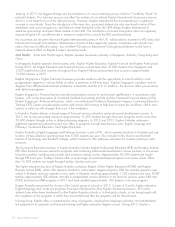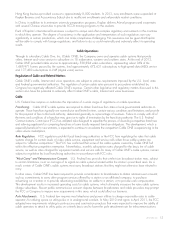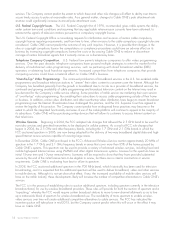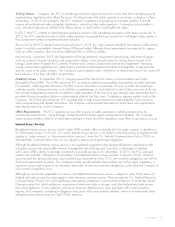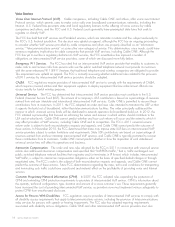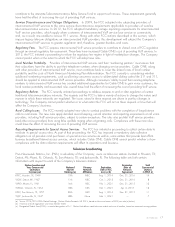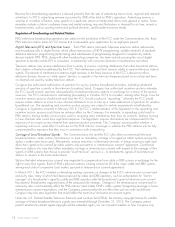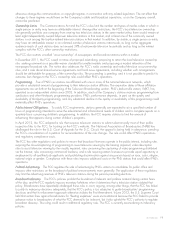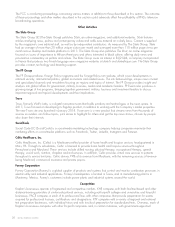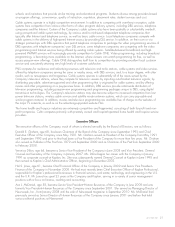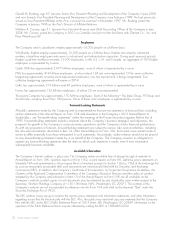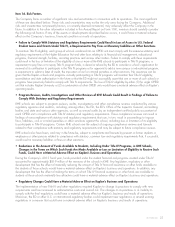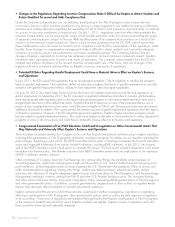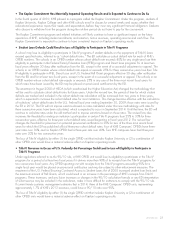Washington Post 2013 Annual Report Download - page 33
Download and view the complete annual report
Please find page 33 of the 2013 Washington Post annual report below. You can navigate through the pages in the report by either clicking on the pages listed below, or by using the keyword search tool below to find specific information within the annual report.Set-Top Boxes. Congress, the FCC and other government agencies have for some time been developing and
implementing regulations that affect the types of set-top boxes that cable operators can lease or deploy to their
subscribers. In 2010, for example, the FCC initiated a regulatory proceeding to consider whether it should
require all multichannel video program distributors, which include cable operators, to develop and provide a
new, universal set-top box solution that allows access to both online and traditional video.
In 2011, the FCC initiated a rulemaking proceeding to review a rule prohibiting encryption of the basic service tier. In
2012, the FCC amended its rules to allow cable operators to encrypt the basic service tier in all-digital cable systems if
they comply with certain consumer-protection measures.
Also in 2012, the FCC clarified and waived until June 3, 2014, the “open industry standard” that requires cable set-top
boxes to include a recordable, Internet Protocol (IP)-based output. Although these requirements are expected to impose
costs on cable operators, they now have additional time in which to comply.
Most recently, in January 2013, the Department of Energy tentatively designated set-top boxes and network equip-
ment as covered consumer products and proposed to adopt a new test procedure for set-top boxes as part of its
Energy Conservation Program for Consumer Products and Certain Commercial and Industry Equipment. Imposing
energy conservation regulations on cable industry products could impede innovation and upgrades in set-top boxes
and be costly to the cable industry. The Company cannot predict when, whether or to what extent any of the issues will
be resolved or how they will affect its operations.
Disability Access. In September 2010, Congress passed the Twenty-First Century Communications and Video
Accessibility Act (CVAA). The CVAA directs the FCC to impose additional accessibility requirements on cable operators.
For example, cable operators that serve 50,000 or more subscribers must provide 50 hours of video description per
calendar quarter, during prime time or on children’s programming, on each channel on which they carry one of the top
five national nonbroadcast networks. In addition, cable operators of all sizes must pass through video description that is
provided for each broadcast station or nonbroadcast network that they carry. Compliance imposes certain costs on the
Company. The CVAA also directs the FCC to adopt rules to help ensure that persons with disabilities have access to
video programming and related information. The Company cannot predict the extent to which these new requirements
may impose new costs on the Company.
Other Requirements. The FCC regulates various other aspects of cable operations, including certain terms for
commercial leased access, signal leakage, distant broadcast station signals and technical standards. The Company
cannot predict whether, when or to what extent changes to these and other regulations may affect its operations or costs.
Internet Access Services
Broadband Internet access service, which Cable ONE currently offers on virtually all of its cable systems, is classified as
an “information service” in the U.S. As a result, Internet access service is not subject to the full panoply of regulations that
applies to “cable services” or “telecommunications services” under the U.S. Federal Communications Act of 1934, as
amended (the Communications Act), nor is it subject to state or local government regulation.
Although broadband Internet access service is not regulated, regulations that distinguish between interference with
subscriber access and reasonable network management are evolving and, over time, could begin to interfere
with Cable ONE’s ability to manage its network or provide services to its subscribers. In 2010, the FCC imposed
certain “net neutrality” obligations on providers of broadband Internet access services. In January 2014, a federal
court vacated the anti-discrimination and anti-blocking requirements of the FCC’s net neutrality obligations, but left the
disclosure requirements in place. The Company cannot predict whether there will be any further legal, regulatory, or
legislative action with respect to net neutrality. Imposition of new net neutrality obligations could cause the Company to
incur certain compliance costs.
Although not specifically regulated as a service, broadband Internet access service is subject to many of the same U.S.
Federal and state privacy laws that apply to other electronic communications. These include the U.S. Federal Electronic
Communications Privacy Act, which addresses interceptions of electronic communications that are in transit; the Stored
Communications Act, which addresses acquisitions of electronic data in storage; and other Federal and state privacy
laws and regulations. As the collection and use of consumer data becomes more prevalent in the communications
industry, the Company’s compliance obligations may grow. We cannot predict whether, when or to what extent these
obligations may impose costs on Cable ONE’s business.
2013 FORM 10-K 15


